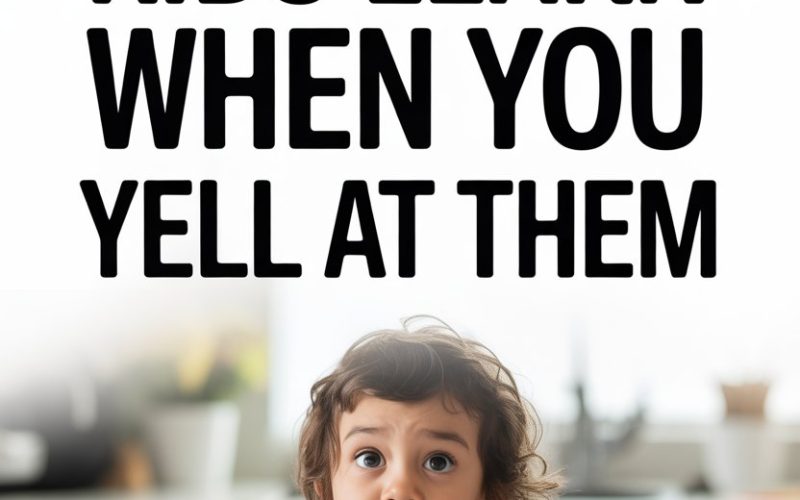Ever found yourself bellowing across the living room, only to be met by a small human with a quivering lip and wide eyes? Welcome to the club.
If you’ve ever wondered what your child is actually absorbing when the decibels rise, you’re not alone.
Here’s what busy parents need to know about the (mostly unintentional) lessons being taught when voices are raised—and what you can do instead.
1. Expecting to Be Yelled At Means They’re Learning Fear, Not Respect
You want them to listen. Maybe you want a bit of peace. And, let’s be honest, you want to feel like you’re not shouting into a void.
It’s tempting to think raising your voice will snap your child into shape, but research says otherwise.
According to this study from the University of Pittsburgh, frequent shouting at kids doesn’t make them respect you—it makes them anxious, withdrawn, and even more likely to misbehave.
Children are wired to look to their caregivers for cues on how to respond to the world. When those cues are angry, their bodies go straight into “fight or flight” mode.
You might notice this as a blank stare, a sudden pout, or a meltdown of Olympic proportions. Underneath it all, their brains are lighting up with stress hormones, which makes it a lot harder to process what you’re actually saying.
So, what sticks?
Not your wise words about sharing toys or keeping toothpaste off the walls. Instead, your child learns that anger equals power, or worse, that love is conditional.
What helps? Next time you’re about to shout, try stopping mid-breath and stepping out of the room for ten seconds. It’s not magic, but it’s enough to change the script.
Even better, narrate this to your child: “Mum is getting really cross and needs a minute.” That’s teaching emotional regulation—something most grown-ups are still working on.
2. Conflict Resolution 101: If Yelling is Normal, Yelling Becomes Their Default
Parental yelling doesn’t happen in a vacuum. Kids are little copycats.
If you yell, it’s only a matter of time before you hear your words (and volume) parroted right back, whether it’s at the supermarket or in front of your in-laws. Children learn by watching, listening, and imitating—sometimes with unnerving accuracy.
A research from the Journal of Child Abuse and Neglect found that children who experience high levels of verbal aggression at home are more likely to use loud voices, threats, or shouting to solve their own problems. It’s monkey see, monkey do, except nobody’s laughing.
This doesn’t mean you’re solely responsible for every playground squabble, but it does mean your reactions set the tone.
When yelling is the household soundtrack, it becomes the blueprint for handling frustration, anger, or even excitement.
Feeling like you’re stuck in a shouting match? Try lowering your voice instead. Whisper if you have to.
It feels weird, but you’ll watch your child lean in closer, desperate to catch what you’re saying. Suddenly, you’re back in control—no vocal cord sacrifice required.
3. Their Self-Worth Gets Tied to Your Volume
Here’s the bit that stings: Kids don’t just hear your words—they interpret your tone as a reflection of how you feel about them.
Young children, especially, see themselves through your eyes. A raised voice can turn a small mistake (“Oops, spilled my juice again!”) into a catastrophic self-judgment (“Mum’s yelling, so I must be bad”).
Long-term, this can chip away at self-esteem. According to child psychologist Dr. Laura Markham, kids who are regularly yelled at are more likely to internalise shame and doubt, feeling they’re never quite good enough.
Not exactly the confidence boost you were aiming for.
The next time you catch yourself about to erupt over yet another Lego landmine or sibling spat, try focusing on the behaviour, not the child. Swap “You’re so messy!” for “Toys need to be picked up before tea.”
Correct the action—don’t attack the person. It’s harder than it sounds, but your child’s self-image will thank you.
What’s a Realistic Parent to Do—Tonight?
Perfection isn’t the goal. Everyone slips up. There’s no medal for “Least Yelling in a Week” (though wouldn’t that look nice on the mantelpiece?). What matters is what you do next.
Start small. When you feel your fuse shortening, announce it: “I’m getting frustrated and need a second.”
Model deep breaths or count to five out loud. This feels silly, but it’s less damaging than turning up the volume.
Apologise when you do shout. Kids are surprisingly forgiving, and nothing earns respect like honesty: “I’m sorry for yelling. I was upset, but I shouldn’t have shouted. Let’s try again.”
That’s teaching accountability and giving your child permission to make mistakes, too.
If the yelling habit feels impossible to break, know you’re not alone. Plenty of parents rely on gentle parenting podcasts or parent support groups for ideas—and the occasional vent.
Sometimes, just hearing that everyone struggles makes all the difference.
Raising Voices, Lowering Stress
Life with kids means noise, and sometimes, that includes yours. No parent is perfectly calm, zen, and unflappable (unless you count statues).
Still, the real lessons stick in the quiet moments: gentleness, second chances, and learning together—volume optional.
Tonight, if you catch yourself about to raise your voice, try something new. Whisper. Pause. Or, if you must, send yourself to your room for a quick reset.
You might be surprised at what your kids pick up when you lower the pitch and raise the connection.




